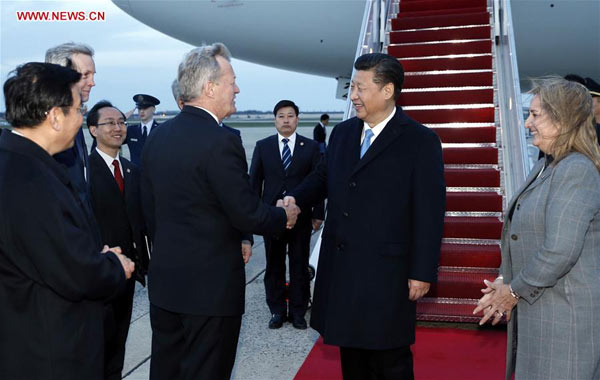China's efforts assure the success of "Iranian" style solution
Updated: 2016-04-01 10:37
By Hua Liming(chinadaily.com.cn)
|
|||||||||
 |
|
Chinese President Xi Jinping (2nd R) arrives for the fourth Nuclear Security Summit in Washington, the United States, March 30, 2016. [Photo/Xinhua] |
The 2016 Nuclear Security Summit takes place in Washington D.C. on March 31 and April 1. For the past year, leaders of global powers retrospect their efforts of maintaining nuclear non-proliferation. Iran had one of the most significant achievements after signing peaceful agreements with P5+1 countries and giving up its nuclear weapon program.
The peaceful solution of the Iran nuclear problem has, first of all, prevented a war. Both Israel and the US had made it clear that they would eradicate Iran’s nuclear devices in case Iran crosses the nuclear border. That would be a nuclear-related war, which would cause greater turmoil in the Middle East.
The peaceful solution of the Iran nuclear problem has also set a precedent of peacefully defending the Non-Proliferation Treaty (NPT). According to the NPT, only the US, UK, China, France, and Russia have the right to own nuclear weapons; no other nation or region is allowed to do so. However, in reality, Israel, India, and Pakistan all claim to owning nuclear weapons, while Iraq before the invasion of US was also pursuing nuclear ability.
Before the solution of the Iranian nuclear problem, the major powers had only two choices: tolerating the illegal nuclear states or terminating the illegal nuclear states. They tolerated Israel, India, and Pakistan, while the US invaded Iraq overthrowing the Saddam Hussein regime. A third mode now emerges, which brings hope of better defending the NPT without challenging peace.
Many people thought the Iran nuclear problem was trouble for the US only and attributed its peaceful solution to the US. This is a serious misunderstanding. It was in 2003 that US spy satellites found Iran was developing nuclear weapons; the P5+1 mechanism was established in 2006 and the Security Council had passed sanctions four times against Iran. All these show the Iran nuclear program to be a challenge for the NPT and the entire international society.
As a permanent member of the Security Council, China has played a key role over the years in negotiations. From 2006 to 2013, there were negotiations but the negotiations were not going smoothly. The divergences between the US and Iran were too big.
Every time the negotiations came to a stalemate because of antagonism between the US and Iran, it was China that maintained the negotiation and prevented it from breaking down. Thus an interesting phenomenon appeared in the negotiation process of the Iran nuclear problem: they always failed to reach a consensus but they always promised to continue talking, until they finally reached a consensus. Without China, that would have been impossible.
The US-Iran relationship began improving in 2013. The two sides started talking about exchanges of interests, which was actually more difficult because their true interests. China helped in the negotiations, and after 18 months of efforts, they finally made it. Therefore it is unfair to call the solution of the Iran nuclear problem a victory for the US. It is a victory of for the international society, to which China is a major member.
The peaceful solution of the Iran nuclear problem also offers some food for thought for nuclear programs of the Democratic People’s Republic of Korea. It might involve more difficulties because a state of war still exists between the DPRK and the US. But as long as negotiations continue, there is hope. China is playing a positive role in the process and we hope both the DPRK and the US can echo its initiative to peacefully solve the problem.
The author is a former Chinese ambassador to Iran and now a researcher at the China Institute of International Studies. This is an excerpt of his interview with China Daily’s Zhang Zhouxiang.
Related Stories
Clear commitment to global nuclear security 2016-04-01 08:10
Joint bid to fight global nuclear risk 2016-04-01 08:09
China, US vow to boost nuclear security cooperation 2016-04-01 06:58
China's role in nuclear safety shows it's responsible player 2016-03-31 13:49
Today's Top News
Inspectors to cover all of military
Britons embrace 'Super Thursday' elections
Campaign spreads Chinese cooking in the UK
Trump to aim all guns at Hillary Clinton
Labour set to take London after bitter campaign
Labour candidate favourite for London mayor
Fossil footprints bring dinosaurs to life
Buffett optimistic on China's economic transition
Hot Topics
Lunar probe , China growth forecasts, Emission rules get tougher, China seen through 'colored lens', International board,
Editor's Picks

|

|

|

|

|

|







